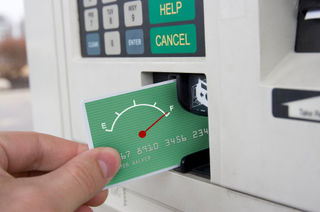Stress
Refueling Your Engine: Strategies to Reduce Stress and Avoid Burnout
Finding the right fuel for your engine.
Posted January 11, 2011 Reviewed by Jessica Schrader

My last post, Running on Empty, described symptoms that, if present, suggest you might be on the road to burnout. If you found yourself identifying with a lot of those symptoms, it's normal to feel upset. When you're used to traveling at Mach 3, pulling back to a comfortable Mach 2 may seem ... well, a little disappointing.
But the important thing to keep in mind is that you are still the same person you were when you entered the race. Your drive, your enthusiasm, your passion, and your energy may have gotten buried under the weight of the stress you've been carrying around, but those qualities and all the other good ones are still inside you. You just need to find ways to reach inside and find the sparks that first ignited your engine so that you can climb back into the driver's seat and reenter the race.
Here are a few suggestions that can help you get back up to speed.
Don't ignore basic maintenance
In the game of life, there are a few basic rules you must follow if you want to survive. Of course, as in any game, you can bend the rules, cheat a little. But in the end, whether you like it or not, if you want to live, you have to find a way to work these things into your life.
- Rule 1. You have to sleep.
- Rule 2. You have to eat.
- Rule 3. You have to drink.
(Of course, breathing is in there, too. But if you're that far gone, you're probably not reading this blog.)
The problem is that high octane women tend to cheat—a lot—in the basic maintenance game. Sure, you sleep, but probably not enough. You eat, but usually not very well. And you drink, but likely not enough of the right stuff (and, in some cases, maybe too much of the wrong stuff). In the end, though, you're only cheating yourself. The solution is simple: sleep as much as possible, don't skip meals, eat healthy, and drink a lot of water. You'll be amazed at how much better you'll feel once you start incorporating a healthy dose of all three into your routine.
Remember when ...
Busy schedules have an interesting way of making you forget the things that you once found relaxing. In fact, many high octane women have drifted so far away from anything resembling relaxation that they have a hard time remembering what they used to do to relax. My advice? Try harder! At some point in your life, even if you have to go way back, I'm sure you've done something that you found relaxing. Resurrect those memories and find ways to incorporate those things back into your life.
Just say no
If you're like most high-achievers, you're probably used to doing everything you're asked to do and doing it well, but each time you add a new commitment or responsibility to your plate, you're adding stress into your life. So try something new. Resist the urge. Just say no.
Exercise
Yeah, right! Who has time for it? You do actually. Exercise is a great stress reducer, and even if you can't find time for a complete exercise routine, you can still incorporate exercise into your daily routine. How? Take a brisk 10-minute walk during your lunch hour. Park your car far from your building so you have to walk more. Take the stairs instead of the elevator. Want something a bit more creative? Keep lightweight dumbbells on the passenger seat of your car, and when you're stuck in traffic or stopped at a traffic light, do a quick arm workout while you're waiting. Do you work at a desk? Try rolling your wrists, ankles, neck, and shoulders while you're sitting there or stretch your muscles by turning your torso from side to side. Another good seated exercise is calf raises. So no more excuses. Get going!
Bring in the positive, throw out the negative
Positive people have a lot of energy, and their energy and enthusiasm tend to lift the spirits of those around them. Negative people tend to have the opposite effect; they drag you down. So a great way to reduce stress in your life is to hang out with as many positive people as possible and move out as many negative people as possible.
Inside and outside the box stress management strategies
Of course, the "tried and the true" ways to manage stress include guided imagery, progressive muscle relaxation, deep breathing exercises, reframing negative thoughts into positive, meditation, yoga, warm baths, and massage. But if you're like many high octane women, traditional stress management strategies may not be your cup of tea. And that's OK. No one (other than you) should be defining what is relaxing. You need to find what works for you, and sometimes that requires thinking outside of the box.
One idea that has worked for a lot of high-achievers is "extreme vacations." Ever thought of sandboarding in the Peruvian desert? Dog sledding in Alaska? Rushing down raging rapids? Extreme vacations are designed for people who love challenges. So if that's what you enjoy, why not try it out? Yes, they're expensive. But if you're like many high octane women, when is the last time you took a real vacation? And if it rejuvenates your spirit, isn't it worth it?
In closing, the most important thing to remember is that while there are many ways to reduce stress (some are mentioned here; many others are not due to space), the key to effective stress management is rarely some seven-day or 30-day program that tells you what to do to relax or how to find "balance." The key is discovering your own "program," one that works for you and your lifestyle, and making the commitment to incorporate it into your life. Once you do, you'll find yourself leaving the dangerous track--the one that leads to burnout--and crossing over to a safer and healthier road where you can rediscover the passion that once fueled your high octane engine.
The suggestions contained in this post are taken from High Octane Women: How Superachievers Can Avoid Burnout.
© 2011 Sherrie Bourg Carter. All rights reserved.




